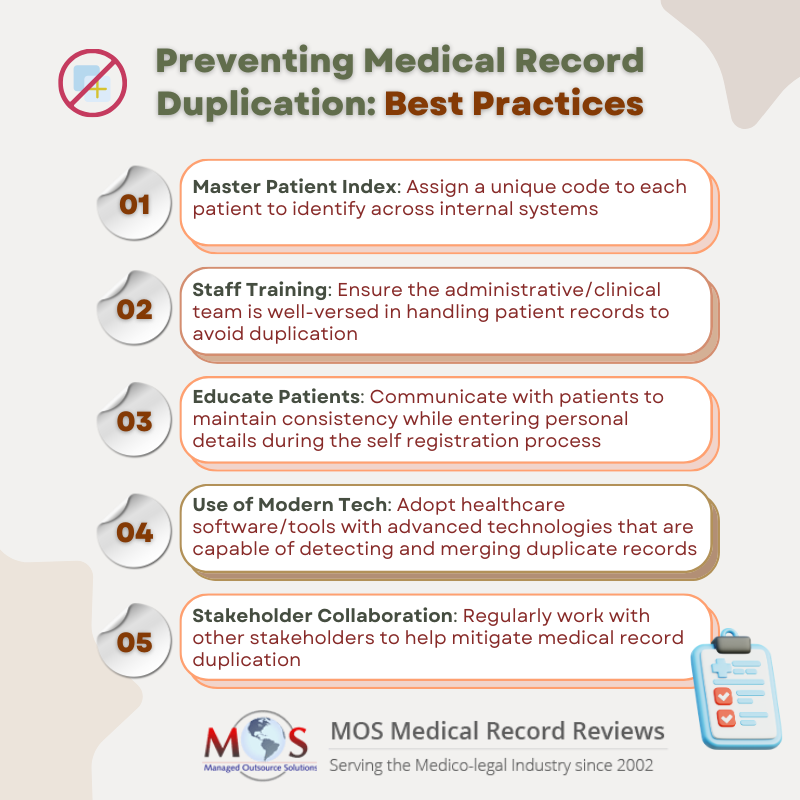Medical record duplication creates significant challenges in the healthcare systems that can lead to excessive operational costs, patient care issues and other inefficiencies. The rate of duplication is rising—with healthcare rapidly adopting technology and the volume of Electronic Health Records (EHR) growing with it. In fact, the rate of duplication ranges from 5% to 10%, according to a study by the American Health Information Management Association (AHIMA). This poses several serious risks that could destabilize the overall integrity of a practice or the healthcare system, as a whole.
This post explores the issues of medical record duplication, the top five causes behind it and solutions to nullify the issue.
Why Is Medical Record Duplication a Serious Problem?
There are several issues associated with duplication of a medical record for both healthcare providers and patients.
Some of the key problems include:
- Increased Costs: One of the major challenges with duplicated records is the bump in overall cost of healthcare services due to the amount of additional administrative work, such as merging records and verifying patient details. Also, unnecessary tests and procedures performed due to incomplete medical records, can also contribute to unexpected expenses.
- Incomplete Patient Information: Duplicate records lead to inconsistency in patient records. This becomes a serious issue when a provider makes assessment and conducts treatment based on incomplete patient information, which then leads to medical errors like misdiagnoses, incorrect medications or duplicated treatment procedures.
- Operational Inconsistencies: Duplicate medical records can slow down the daily operations of a healthcare practice, causing delays in treatments and affecting overall patient care. The staff will be forced to sit through analyzing volumes of redundant information, eventually wasting their time and increasing the chance of making errors in patient assessments.
Five Unexpected Causes of Medical Record Duplication
- Human Error: Data entry is a routine task in a practice’s day-to-day operations but simple, unintentional mistakes during manual entry can cause record duplication. For instance, same names misspelled in different areas in the document or a wrong birthdate can lead to creating a new record rather than updating the existing one. The fast-paced healthcare environment and workload stress can have a significant impact on data accuracy.
- Lack of Internal Standardization Across Practices: Despite digital advancements, many healthcare practices do not have a standardized system to access and handle patient records. For instance, 70% of healthcare practices still use fax machines to transfer and retrieve patient records. But, when a patient’s records are sent multiple times, duplications are inevitable. Also, when digital records are transferred, they can get converted into multiple versions of PDFs or images, each will appear different but would be the same record.
- Patient Self Registration: Even though technology has increased convenience with the adoption of patient portals with self-registration capabilities, it has also opened up doors to record duplication. Patients may accidentally provide different contact information as opposed to the data which is already in the system that leads to the creation of multiple records, especially if the system is not advanced enough to detect duplications and merge similar entries.
- Healthcare Software Tools: Adoption of technology has helped streamline redundant processes involved in medical records review and upkeep, but sometimes, it can also contribute to unexpected data duplications. Rare technical glitches or human errors can unintentionally generate multiple copies of the same record which can clutter the already intricate system of patient medical records and jeopardize operational functionality.
- Mergers and Acquisitions: This occurs when healthcare practices acquire or merge with outside firms, new patient data from external sources will be merged with the existing records. And, if the system doesn’t appropriately reconcile and merge the records, duplication will occur, as patient(s) may have received care at the practice which is now merged or acquired by the original practice.
Solutions to Prevent Medical Record Duplication
There are several ways to drastically mitigate duplicate medical records being created in the system. Healthcare practices can make use of unique patient identifying systems like Master Patient Index (MPI), which essentially assigns a distinct code to each patient across all systems, thereby consolidating information and reducing duplication. Training the staff to double-check the accuracy of patient information and having clear data entry guidelines in place will minimize duplication. Incorporating healthcare software with advanced automation with smart algorithms can detect and merge duplicate records. Also, educating patients on maintaining consistency while entering personal details during self-registration, plays a crucial role in mitigating duplications and improve patient care and practice’s operational efficiency.
Medical record duplication still remains a serious issue that plagues healthcare practices of all sizes. It significantly impacts operational efficiency, patient care and costs as well. These problems can be mitigated by implementing solutions such as a unique patient identifying system, proper staff training and adopting advanced technologies that can detect duplicate records.
MOS provides comprehensive deduplication services that can streamline your medical record review process. We make use of advanced automation technologies like AI/ML to identify and eliminate record duplications and help improve accuracy in reviews & assessments, thereby enhancing your practice’s overall efficiency.
Get in Touch with Our Team for Effective Deduplication Services





